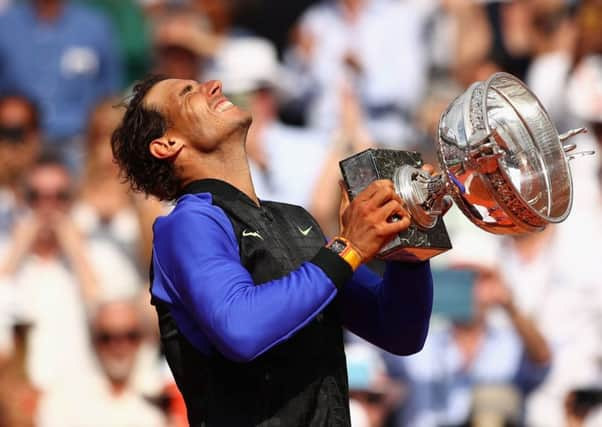Perfect 10 as king of clay Rafael Nadal rules in Paris again


Nadal’s brutal, blistering and, ultimately, predictable demolition of Stan Wawrinka 6-2, 6-3, 6-1 brought him his tenth trophy at Roland Garros and his 15th major title overall. It lifted the Spaniard into second place in the list of all-time grand slam champions; only Roger Federer has more victories with 18. But for all Federer’s remarkable achievements, he has never dominated an event the way that Nadal has at the French Open.
“It has been magical all the things that happened in this tournament for me,” Nadal said. “Today was a very important day for me. Have been some tough moments in the last years – injuries – so it’s great to have a big success like this again.
Advertisement
Hide AdAdvertisement
Hide Ad“In 2005 [his first win] I thought in 2017 I’d be fishing on my boat in Mallorca. I didn’t really think I’d have such a long career and win so many tournaments. Back then, of course, I couldn’t even think a second that this would ever happen to me.”
Nadal has never lost a French Open final. He has lost only two matches in Paris since his first appearance in 2005. Yesterday’s pummelling of Wawrinka meant that, for the third time in his career, he had won the French Open without dropping a set. In fact, he only dropped 35 games on his way to the title (Bjorn Borg is the only man to better that, dropping just 32 games in 1978).
He dismissed seven opponents in just 12 hours and six minutes – that is an average of one hour and 43 minutes, give or take a few seconds, per win. On clay. Over the best-of-five sets. So dominant has Nadal been in Paris that he has only twice been taken to five sets in the French capital – by John Isner in 2011 and by Novak Djokovic in 2013.
By the time Nadal was done with Wawrinka, he had won 37 points more than the Swiss. This was not a victory; this was a thrashing. Nadal had taken on the brute force of Wawrinka and nullified it. The man who had blasted 87 winners – eye-popping, muscular, terrifying winners – past Andy Murray on Friday was held to just 19 winners in the final. And they were outnumbered by the 29 unforced errors he racked up as he tried to find a way to dent the Spaniard’s defences.
Before the match began, Wawrinka had talked gamely about the need to prevent Nadal dictating play with his forehand. Fat chance. And if he thought the forehand was going to hurt him, Wawrinka had clearly forgotten about Nadal’s backhand. It might not be his strongest weapon but it can bludgeon its way through anyone and anything that stands in its way.
“I played against the biggest clay-court player ever,” Wawrinka said. “He won his tenth French Open today, so that’s something huge. When you play against him, he’s an amazing fighter. On clay he’s just tough to play. There is always one ball coming back. There is always spin on the ball. There is always a different bounce than what the other players make on that surface. He creates a doubt that you cannot have if you want to beat him. And on clay especially, because the way he’s moving, it’s even more difficult.”
Wawrinka stuck firmly to Plan A throughout the first set but it was not working. There was no way he was going to be allowed to hit through Nadal, not when Nadal was chasing La Decima. Nadal kept his rival so far behind the baseline that he might as well have been playing on the Périphérique, the ring road that runs around Paris and past Roland Garros.
The old saying has it that if you keep pushing at the door and it will not open, try pulling. But no matter what Wawrinka tried, the path to the trophy was blocked. Nadal was unplayable as he had been throughout the tournament.
Advertisement
Hide AdAdvertisement
Hide AdRobin Haase was the most successful against Nadal: he prised a full eight games from the Spaniard’s racket in the second round. And as he said at the time: “At the beginning, I was waaaay better. And then the warm-up ended.” No one could touch Nadal from the moment he walked through the gates two weeks ago and signed in to play. For Uncle Toni, the ever-present force in Nadal’s life so far, this was his last French Open. He has coached his nephew since Rafael – he is always Rafael to Toni, never Rafa – was three years old but at the end of this year, he will step back. He has travelled the world for long enough. And to complete the journey from the clay courts of their home town of Manacor in Majorca to their place in the history of the sport they have dominated for so long, Toni was ushered on to court to present his nephew with a full-size replica trophy engraved with Nadal’s name, the legend “La Decima” and the dates of his ten victories.
The final took two hours and five minutes. Just 125 minutes to make history. But it will be many, many lifetimes before it is repeated.